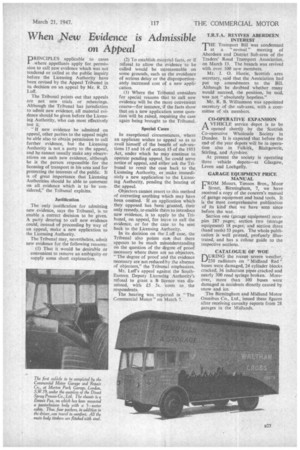When „New Evidence is Admissible
Page 33

If you've noticed an error in this article please click here to report it so we can fix it.
on Appeal
DRINCIPLES applicable to cases where appellants apply for permission to call new evidence which was not tendered or called at the public inquiry before the Licensing Authority have been revised by the Appeal Tribunal in its decision on an appeal by Mr. R. D. Luff.
The Tribunal points out that appeals are not new trials or rehearings. Although the Tribunal has jurisdiction to admit new evidence, all material evidence should be given before the Licensing Authority, who can most effectively test it.
If new evidence be admitted on appeal, other parties to the appeal might be able also to obtain permission to call further evidence, but the Licensing Authority is not a party to the appeal, and he cannot usually make any observations on such new evidence, although he is the person responsible for the licensing of transport in his area and for protecting the interests of the public. It is of great importance that Licensing Authorities should be able to comment on all evidence which is to be considered," the Tribunal explains.
Justification
The only justification for admitting new evidence, says the Tribunal, is to enable a correct decision to be given. A party desiring to call new evidence could, instead of proceeding by way of an appeal, make a new application to the Licensing Authority.
The Tribunal may, nevertheless, admit new evidence for the following reasons: (1) That it would be desirable or convenient to remove an ambiguity or supply some short explanation. (2) To establish material facts, or if refusal to allow the evidence to be called would be unreasonable on some grounds, such as the avoidance of serious delay or the disproportionately increased cost of a new application.
(3) Where the Tribunal considers for special reasons that to call new evidence will be the more convenient course—for instance, if the facts show that on a new application some question will be raised, requiring the case again being brought to the Tribunal.
Special Cases In exceptional circumstances, where an applicant wishes to appeal so as to avail himself of the benefit of sub-sections 15 and 16 of section 15 of the 1933 Act, under which he may continue to operate pending appeal, he could serve notice of appeal, and either ask the Tribunal to remit the case back to the Licensing Authority, or make immediately a new application to the Licensing Authority, pending the hearing of the appeal.
Objectors cannot resort to this method of correcting anything which may have been omitted. If an application which they opposed has been granted, their only remedy, to enable them to introduce new evidence, is to apply to the Tribunal, on appeal, for leave to call the evidence, or for the case to be sent back to the Licensing Authority.
In its decision on the I.uff case, the Tribunal also points Qua that there appears to be much misunderstanding on the question of the degree of proof necessary where there are no objectors. "The degree of proof and the evidence necessary are not reduced by the absence of objectors," the Tribunal emphasizes.
Mr. Luff's appeal against the SouthEastern Deputy Licensing Authority's refusal to grant a B licence was dismissed, with £5 5s. costs to the respondents.
The hearing was reported in "The Commercial Motor" on March 7. T.R.T.A. REVIVES ABERDEEN INTEREST
-r-HE Transport Bill was condemned J. at a " revival " meeting of Aberdeen and District Sub-area of the Traders' Road Transport Association, on March 13. The branch was revived with over 100 new members.
Mr. J. O. Hastie, Scottish area secretary, said that the Association had put up amendments to the Bill. Although he doubted whether many would succeed, the position, he said, was not "absolutely hopeless."
Mr. R. B. Williamson was appointed secretary of the sub-area, with a committee of six members.
CO-OPERATIVE EXPANSION
AVEHICLE service depot is to be opened shortly by the Scottish Co-operative Wholesale Society in Dundee. It is expected that before the end of the year depots will be in operation also in Falkirk, Blairgowrie, Stirling, and Ayrshire.
At present the society is operating three vehicle depots—at Glasgow, Leven and Lochgelly.
GARAGE EQUIPMENT PRICE MANUAL
FROM Messrs. Tirnson Bros., Moor Street, Birmingham, 7, we have received a copy of the concern's manual of garage equipment and hand tools. It is the most comprehensive publication of its kind that we have seen since before the war.
Section one (garage equipment) occupies 287 pages; section two (storage equipment) 18 pages; and section three (hand tools) 53 pages. The whole publication is well printed, profusely illustrated, and has a colour guide to the respective sections.
CATALOGUE OF WOE
DURING the recent severe weather, 250 radiators on "Midland Red ". buses were damaged, 24 cylinder blocks cracked, 36 induction pipes cracked and nearly 300 road springs broken. Moreover, more than 100 buses were damaged in accidents directly caused by snow and ice.
The Birmingham and Midland Motor Omnibus Co., Ltd., issued these figures after receiving casualty reports from 28 garages in the Midlands.












































































